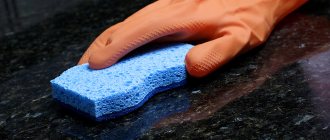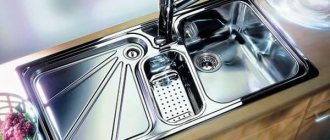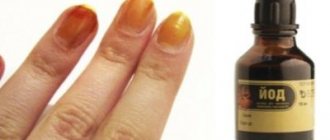How to remove limescale and stains on an artificial stone sink
Minor deposits and stains that have just appeared can be eliminated using improvised means:
- Table vinegar 9%. Pre-dilute with water in a ratio of 1:2. The working area of the bowl is treated with a cloth soaked in the solution, and after 5 minutes it is thoroughly washed with water.
- Soda. The powder is diluted to a paste and applied to contaminated areas for 2-3 minutes. Then the surface of the sink is cleaned with a sponge.
- "Coca-Cola" or "Sprite" . To remove limescale and stains, use undiluted. The technique for processing the sink is similar to the vinegar method, the exposure time is 20 minutes.
Lime deposits are caused by hard water and are especially noticeable on work areas with saturated colors. A water filter will reduce the formation of plaque.
To avoid stains, do not store dirty dishes or vegetables with coloring pigments in the sink.
How to remove scratches
First of all, you need to assess the extent of the damage.
You can deal with minor defects yourself:
- scratches are smoothed evenly with sandpaper using light circular movements,
- cracks are rubbed with abrasive materials, then smoothed with fine-grained sandpaper.
Major damage can be repaired by professional craftsmen using a hot air gun and GOI composite paste. Such services can be ordered at plumbing stores and kitchen equipment installation workshops.
What do we need to clean an artificial stone sink?
Any housewife will have a pack of soda or table vinegar in her kitchen; only excessive reliance on improvised means will shorten the “life” of the installation.
Be sure to read:
How to clean limescale and water stone, how to clean it on the sink, bathtub, tiles and taps
So for constant care of your sink, it’s worth choosing a “profile” arsenal:
- special products for cleaning and washing composite surfaces (marked “for composites”)
- universal household chemicals for cleaning: light abrasive powders such as “Pemolux”, chlorine-containing gels and solutions, pastes/liquids based on organic solvents,
- soft brushes, paper/cloth towels, microfiber cloths, clean rags,
- rubber gloves to protect hands while working with household chemicals.
A sponge based on melamine resin will help. It is made of soft plastic, which, without caustic chemicals, removes rust and stubborn dirt. To obtain cleaning foam, simply moisten the sponge with water.
Properties and specifics of using porcelain stoneware
Sinks made from this material have the following advantages:
- Strength. During manufacturing, the product acquires additional hardness. Therefore, the material is often compared to natural stone.
- Persistence. Not afraid of exposure to household chemicals. Easily tolerates temperature changes.
- Environmentally friendly. Since the product is placed in the kitchen, it is constantly in contact with food and utensils. Porcelain stoneware consists of components that are not harmful to the human body.
- Aesthetics. This point is important for people who love non-standard solutions in the interior. With the help of a sink made of artificial stone, you can not only move away from monotony, but also create harmony and comfort.
Despite the advantages, a porcelain stoneware sink, just like a stainless steel sink, needs regular cleaning.
Usage
Porcelain tiles withstand direct contact with chemicals. But still, you should not expose the surface to aggressive mixtures.
Caustic alkalis, solvents and liquids containing acetone should not come into contact with the surface frequently or in large quantities.
If some of the chemical is on the surface, it must be removed as quickly as possible. Otherwise, the product will remain damaged. Composite stone is a durable and strong material. Falls, strong blows with a heavy object and cuts with a knife leave behind chips and cracks. Over time, the sink becomes covered with scratches, which are noticeable on dark-colored products. To prevent minor defects from causing severe damage, it is necessary to monitor the condition of the material.
Best Cleaning Products
Detergent compositions marked “for treating surfaces made of composite materials” will not only clean, but also protect the sink.
Industrial chemicals are available in gel, liquid or spray form. Such products do not contain caustic alkalis, active chlorine or aggressive acids, so if properly treated, the equipment will retain its attractive appearance for years.
Professional solutions and gels
Chemicals require careful use and strict adherence to instructions.
The most popular cream formulations or sprays for stone sinks are:
- Bagi “Shumanit” for washing sinks made of natural or artificial stone, granite. The consistency is creamy. Eliminates old stains, heavy limescale deposits, polishes the surface. Preserves the richness of color pigments, clogs pores and minor scratches.
- Prosept Cooky- spray for worktops made of acrylic composites. Method of application: spraying. Copes well with stains of various origins and retains color. However, in terms of protective properties it is inferior to Schumanite.
For everyday care, special cleaners can be replaced with universal household chemicals. Cleaning is effective with fine abrasive powders “Chistin” and “Pemolux”, diluted in water to medium viscosity.
The Domestos, Dosya, and Komet gels have good reviews, however, due to the presence of chlorine, they also need to be diluted (2-3 teaspoons of the product per 5 liters of liquid).
Traditional methods
When supplies of store-bought cleaners are exhausted, you can turn to improvised means.
In terms of effect, home methods are inferior to special gels, but they are difficult to overdose on:
- Mustard powder . Cope with fresh stains. The problem area should be moistened with water and a little powder should be poured, rubbed with a sponge and rinsed off. The processing can be repeated.
- Fresh lemon juice. Eliminates stains from tea or coffee, limescale. If you need to remove a stain, squeeze citrus juice onto it; after a minute, wipe the stain with a sponge. Sometimes housewives simply apply a slice of lemon to the surface for 1-2 minutes, and the result is no worse.
- Toothpaste . Universal home cleaner. It has a mild whitening effect, so it is useful for the walls of light-colored bowls. 1-2 spoons of paste are evenly distributed over the surface to be treated, after 5-10 minutes they are rubbed with a sponge. Tooth powder will cope better with limescale deposits.
- Soap and soda solution . You will have to tinker with the preparation, but you can completely get rid of greasy deposits and traces of coffee and tea. A piece of laundry soap the size of a matchbox is dissolved in 50 ml of boiling water, after which 2-3 tablespoons of soda are added, the ingredients are mixed until a homogeneous mass is obtained.
Be sure to read:
How to clear a clogged drain with caustic soda: instructions for use at home?
As is the case with household chemicals, after using home methods, the sink needs to be rinsed and dried. The main rule: you should not completely replace professional products with homemade ones, since they cannot cope with severe stains.
Folk remedies for cleaning
To wash stubborn dirt, housewives use home remedies made from simple and affordable products. If you have to resort to more aggressive household chemicals, you should not let the products work for too long, and after cleaning you need to rinse the product thoroughly. Before doing anything, the sink should be emptied of any debris or food debris. After washing, you need to wipe the plumbing fixtures dry with a paper towel or dishcloth.
Baking soda
Baking soda will help get rid of soap deposits and greasy deposits. A mixture of white powder and water to clean the sink will quickly remove stains. It should be remembered that the use of an abrasive can damage the surface; do not rub sodium bicarbonate too much. Baking soda and vinegar will work well together and will effectively dissolve limescale. It is not recommended to leave the solution on the product for a long time. If there are several problem areas, apply the mixture directly to these areas.
A homemade paste of baking soda and hydrogen peroxide is suitable for stubborn stains. After covering the stain with the paste, apply a damp cloth on top. Leave it overnight. In the morning, moisten a cloth with water and wipe off the mixture. Rinse the area and wipe dry.
Mustard powder
Using mustard powder you can easily get rid of greasy stains on plumbing fixtures. Pasta is prepared from 5 tbsp. l. dry mustard, 1 tbsp. l. soda, mix the ingredients and add 1-2 tbsp. l. water. A product for cleaning stone sinks is applied to problem areas and left for 7-10 minutes. Wipe with a soft cloth, rinse with water. Carefully remove any remaining liquid from the surface to avoid streaks.
Lemon acid
Citric acid will help deal with stains on granite surfaces. The substance gently breaks down dirt and grease without corroding the material. The acid is used in pure form or mixed with tooth powder. If necessary, leave the substance for 10-15 minutes and rinse thoroughly. To prevent the surface from becoming cloudy due to water stains, soap and mineral deposits, the sink is dried.
Table vinegar
Light colored plumbing fixtures will become dull from water minerals if not cleaned regularly. To wash without rinsing, wipe the sink with a solution of white distilled vinegar and water. To prepare a white sink cleaner, boil 200 ml of vinegar and 1 cup of water in the microwave. Add 1 tsp to the slightly cooled mixture. soda and apply the composition to the surface of the plumbing.
Coca Cola
If you need to get rid of dirt on composite plumbing fixtures, you need to pour a little cola, leave it for a few minutes and wipe it off. For tough stains, use a toothbrush to rub the soda into the problem area. Cola effectively dissolves rust and removes lime deposits.
You can wash your artificial stone sink with cola and tooth powder. To do this, apply powder to the surface and wipe with a sponge dipped in soda. Leave to absorb for 10-15 minutes, rinse with warm running water. Apply mineral oil and rub the stone until shiny. The recipe will get rid of white plaque and return the original shine.
Toothpaste
An effective alternative for cleaning granite sinks is toothpaste. The white stone surface often becomes dull and becomes covered with stains that are difficult to remove. A bleaching paste will help remove plaque and restore whiteness; rub it into the stains and leave for 20-25 minutes. Plumbing fixtures are wiped with a rag soaked in vinegar; there is no need to rinse.
Tooth powder also works well on minor scratches. To eliminate damage, rub dry powder with an old toothbrush. At the end of cleaning, wipe with a cloth moistened with mineral oil.
Caring for an artificial stone sink
If you choose the right detergent, there will be no difficulties.
All care includes several sequential steps:
- To remove grease, wash the work area with regular dishwashing detergent.
- Contaminants from food pigments are cleaned.
- A special paste or a handy cleaner is applied to the surface of the kitchen bowl with the countertop.
- After 15-20 minutes, the entire surface is washed with running water and polished with a soft cloth for another minute.
If the sink has been used in a gentle manner, it is enough to wash the walls and bottom with dishwashing gel and wipe dry with a cloth. But global cooking with a pile of greasy dishes requires going through all the steps.
How often to clean the sink
Ideally, minimal maintenance is needed after each use of the sink, but much depends on the characteristics of a particular product.
You need to focus on the manufacturer’s recommendations, as well as the general rules for eliminating persistent contaminants:
- Once a week, fill the bowl with water at room temperature. Add 1-2 teaspoons of chlorine-based cleaning gel to it and leave for 20 minutes. Upon completion of the procedure, the surface must be thoroughly washed and then polished with a microfiber cloth.
- Once every 3 weeks, the work area is treated with household bleach. It is simple to prepare the solution: 1 part of the product is diluted in 5 parts of water. The composition is applied for 1-2 hours.
When using universal chemistry, it is unacceptable to exceed the concentration of the finished solution and the recommended processing time. If you overdo it, the composite will change color.
Properties of artificial stone
Acrylic resins and stone chips give the artificial stone strength, moisture resistance, durability of color pigments, and the overall structure of the stone mass is uniform.
Be sure to read:
How to remove stone, rust from the toilet and limescale in the tank using folk remedies?
However, this product has features that complicate its everyday use:
- Stains from coffee, tea, and vegetables quickly appear on a light bowl. If they are not removed in a timely manner, they eat into the surface and gradually blur, forming unsightly stains.
- The composite does not tolerate high temperatures. It leads to the destruction of the connecting components, as a result of which the sink begins to crumble.
- Strong mechanical impact is fraught with consequences. Cracks and chips appear when a heavy object falls into the sink.
- When a faucet pipe leaks, rusty streaks form.
Initially, the consumer characteristics of an artificial surface are determined by the quality of the composite material. It is unlikely that equipment that is too cheap will retain its impeccable appearance for a long time.
How not to wash artificial stone products
The structure of the stone reacts negatively to chemicals that can dissolve resin and acrylic. These are caustic alkalis, concentrated acids, and other aggressive substances. Therefore it is prohibited to use:
- solutions for cleaning plumbing lines,
- cleaners for kitchen stoves, ovens, ovens,
- paint solvents, acetone.
Depending on the composite characteristics of a particular sink, there may be additional restrictions. As a rule, manufacturers include instructions that indicate the specifics of washing and cleaning the stone product.
Care Tips
Your sink will last longer, and you will have to wash it much less often if you follow certain rules given below:
- Do not place a hot pot or frying pan off the heat on the surface of the sink.
- Do not leave dirty dishes with leftover food or drinks overnight. Do not throw out the leftover tea or coffee. If spilled, rinse immediately with water.
- A leaking faucet can cause rust deposits. And the appearance of a permanent stain.
- Immediately after using the sink, remove any plaque or grease deposits. Don't put it off until tomorrow.
- After cleaning the sink, wipe it dry.
- Avoid hitting the surface of the product.
- The stone sink does not like sudden temperature changes. Cool boiling water and ice water.
- It is not recommended to use abrasive materials, metal sponges and brushes.
- Limit contact with aggressive acids, 90 percent vinegar essence, acetone, and solvents.
You need to take care of the product regularly, after each dishwashing. Follow the rules, and then your item will serve you for a long time!
Was this article useful to you?











